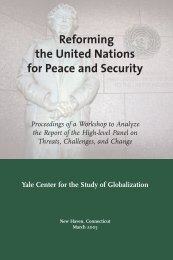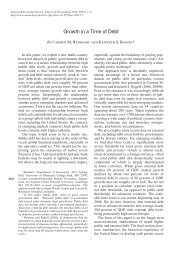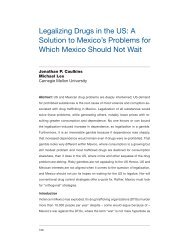The collapse of global trade, murky protectionism, and the crisis:
The collapse of global trade, murky protectionism, and the crisis:
The collapse of global trade, murky protectionism, and the crisis:
You also want an ePaper? Increase the reach of your titles
YUMPU automatically turns print PDFs into web optimized ePapers that Google loves.
<strong>The</strong> <strong>collapse</strong> <strong>of</strong> <strong>global</strong> <strong>trade</strong>, <strong>murky</strong> <strong>protectionism</strong>, <strong>and</strong> <strong>the</strong> <strong>crisis</strong><br />
ing public services (ra<strong>the</strong>r than rhetoric) – more aggressively resist domestic preferences<br />
than elected leadership. This makes sense, in that <strong>the</strong> government agencies<br />
more acutely feel <strong>the</strong> pinch <strong>of</strong> politically-imposed, inefficient, <strong>and</strong> potentially crippling<br />
welfare losses. Complex preferences also inject unnecessary inefficiency into<br />
<strong>the</strong> procurement process through <strong>the</strong> time <strong>and</strong> effort that private-sector firms must<br />
devote to learning <strong>the</strong> nuances <strong>of</strong> unduly complex government rules <strong>and</strong> monitoring<br />
<strong>the</strong>ir manufacturing/ importing/development efforts to remain in compliance.<br />
Protection invites retaliation<br />
By <strong>the</strong>ir nature, market-opening procurement agreements are reciprocal. One nation<br />
opens its domestic market in return for better access to foreign procurement markets.<br />
Protectionism can undo this bargain <strong>and</strong> this, ultimately, limits domestic firms' access<br />
to foreign markets.<br />
Short-term, episodic <strong>protectionism</strong> has <strong>the</strong> potential to violate pre-existing international<br />
agreements <strong>and</strong> obligations.<br />
<strong>The</strong>se actions, particularly when adopted by major industrialised nations, also<br />
diminish those States' st<strong>and</strong>ing as leaders <strong>and</strong> proponents <strong>of</strong> free <strong>trade</strong>. <strong>The</strong> US, for<br />
example, severely undermined its leadership position in free <strong>trade</strong> when it attempted<br />
to restrict o<strong>the</strong>r nations' access to Iraqi reconstruction work. <strong>The</strong> costs <strong>of</strong> such political<br />
<strong>the</strong>atre clearly outweigh any long-term benefits. Moreover, to <strong>the</strong> extent that certain<br />
protectionist acts, such as invoking emergency exceptions, may be permissible<br />
within <strong>the</strong> letter <strong>of</strong> <strong>the</strong> law, <strong>the</strong>y clearly violate <strong>the</strong> spirit <strong>of</strong> <strong>the</strong> free-<strong>trade</strong> agreements,<br />
<strong>and</strong> even-<strong>the</strong> most finely crafted technical defences prove unpersuasive in <strong>the</strong> court<br />
<strong>of</strong> public opinion.<br />
Procurement preferences routinely fail to achieve intended outcomes<br />
Procurement preferences consistently prove <strong>the</strong>mselves blunt, ra<strong>the</strong>r than surgical,<br />
instruments. <strong>The</strong>y are remarkably imprecise, favouring a small number <strong>of</strong> sophisticated<br />
participants within targeted groups.<br />
Procurement preferences are bad governance<br />
As wealth distribution tools, procurement preferences (as opposed to direct investment,<br />
support, or subsidies) impede transparency by masking <strong>the</strong> true cost <strong>of</strong> <strong>the</strong> subsidy<br />
or support programs. Should governments intend to assist, support, or subsidise<br />
individuals, institutions, or industries (such as a domestic steel industry), <strong>the</strong>y should<br />
do so directly <strong>and</strong> transparently, publicly quantifying <strong>and</strong> disclosing <strong>the</strong> level <strong>of</strong> support,<br />
subsidy, or relief. If <strong>the</strong> costs <strong>of</strong>, or externalities associated with, that subsidy or<br />
support are unpalatable, disguising <strong>the</strong>m in <strong>the</strong> procurement process is not only inefficient<br />
<strong>and</strong> ineffective, but also disingenuous.<br />
Governments should not fall into <strong>the</strong> trap <strong>of</strong> deploying protectionist procurement<br />
practices in times <strong>of</strong> economic <strong>crisis</strong>. Ra<strong>the</strong>r, governments should focus on optimizing<br />
<strong>the</strong> performance <strong>of</strong> <strong>the</strong>ir procurement systems.<br />
Economic <strong>crisis</strong> <strong>and</strong> stimulus as a good governance opportunity<br />
We believe that crises <strong>of</strong>ten present a unique opportunity to address long-term, systemic<br />
problems. Today, governments should leverage <strong>the</strong> momentum from <strong>the</strong>ir<br />
responses to <strong>the</strong> financial <strong>crisis</strong> to make long overdue improvements to <strong>the</strong>ir public<br />
procurement regimes. As, for <strong>the</strong> foreseeable future, governments spend an increas-<br />
89





